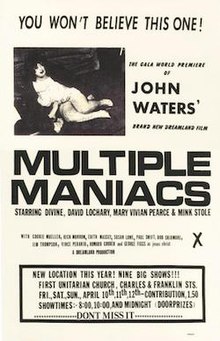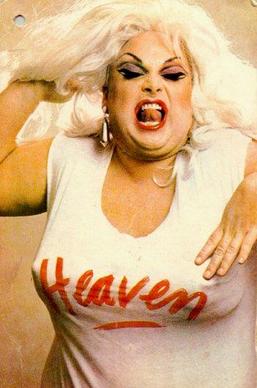
Harris Glenn Milstead, better known by the stage name Divine, was an American actor, singer, and drag queen. Closely associated with independent filmmaker John Waters, Divine was a character actor, usually performing female roles in cinematic and theatrical productions, and adopted a female drag persona for his music career.

Pink Flamingos is a 1972 American black comedy film by John Waters. It is part of what Waters has labelled the "Trash Trilogy", which also includes Female Trouble (1974) and Desperate Living (1977). The film stars the countercultural drag queen Divine as a criminal living under the name of Babs Johnson, who is proud to be "the filthiest person alive". While living in a trailer with her mother Edie, son Crackers, and companion Cotton, Divine is confronted by the Marbles, a pair of criminals envious of her reputation who try to outdo her in filth. The characters engage in several grotesque, bizarre, and explicitly crude situations, and upon the film's re-release in 1997 it was rated NC-17 by the MPAA "for a wide range of perversions in explicit detail". It was filmed in the vicinity of Baltimore, Maryland, where Waters and most of the cast and crew grew up.
David Crawford Lochary was an American actor, one of the regular "Dreamlander" actors in early films of the controversial "trash" film director John Waters. He starred in such films as Pink Flamingos, Female Trouble, and Multiple Maniacs, in which he typically played exotically-dressed, sophisticated perverts. Lochary co-wrote The Diane Linkletter Story with Divine, and worked as an uncredited hair and makeup artist on many of Waters' films. Lochary met Divine at beauty school and used to style his wigs and makeup for parties. Divine later commented that he had "never even heard the word 'drag' before David."

John Samuel Waters Jr. is an American filmmaker, writer, actor, and artist. He rose to fame in the early 1970s for his transgressive cult films, including Multiple Maniacs (1970), Pink Flamingos (1972) and Female Trouble (1974). Waters wrote and directed the comedy film Hairspray (1988), which was later adapted into a hit Broadway musical and a 2007 musical film. Other films he has written and directed include Desperate Living (1977), Polyester (1981), Cry-Baby (1990), Serial Mom (1994), Pecker (1998), and Cecil B. Demented (2000). His films contain elements of post-modern comedy and surrealism.
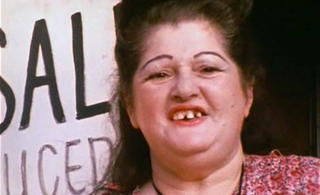
Edith Massey was an American actress and singer. Massey was best known for her appearances in a series of movies by director John Waters. She was one of the Dreamlanders, Waters's stable of regular cast and crew members.
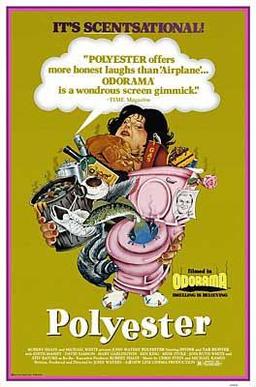
Polyester is a 1981 American comedy film directed, produced, and written by John Waters, and starring Divine, Tab Hunter, Edith Massey, and Mink Stole. It satirizes the melodramatic genre of women's pictures, particularly those directed by Douglas Sirk, whose work directly influenced this film. The film is also a satire of suburban life in the early 1980s, involving topics like divorce, abortion, adultery, alcoholism, racial stereotypes, foot fetishism, and the religious right.

Female Trouble is a 1974 American independent dark comedy film written, produced and directed by John Waters. It stars Divine, David Lochary, Mary Vivian Pearce, Mink Stole, and Edith Massey, and follows delinquent high school student Dawn Davenport, who runs away from home, gets pregnant while hitchhiking, and embarks upon a life of crime.
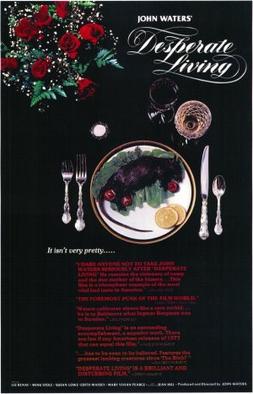
Desperate Living is a 1977 American black comedy film directed, produced, and written by John Waters. The film stars Liz Renay, Mink Stole, Susan Lowe, Edith Massey, Mary Vivian Pearce, and Jean Hill.
Dorothy Karen "Cookie" Mueller was an American actress, writer, and Dreamlander who starred in many of filmmaker John Waters' early films, including Multiple Maniacs, Pink Flamingos, Female Trouble, and Desperate Living.
Mary Vivian Pearce is an American actress. She has worked primarily in the films of John Waters.

Roman Candles is a 1966 short film directed by John Waters and starring Divine, Mary Vivian Pearce, David Lochary, Mink Stole, and Maelcum Soul.
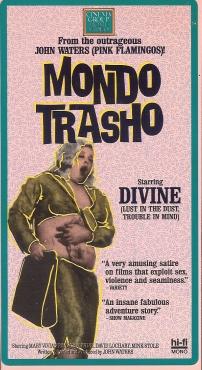
Mondo Trasho is a 1969 American 16mm mondo black comedy film by John Waters. The film stars Divine, Mary Vivian Pearce, David Lochary and Mink Stole. It contains very little dialogue, the story being told mostly through musical cues.

The Diane Linkletter Story is a 1970 16mm short film by American filmmaker John Waters starring Divine, Mary Vivian Pearce, and David Lochary.

Dreamlanders are the cast and crew of regulars whom John Waters has used in his films. The term comes from the name of Waters' production company, Dreamland Productions.

Divine Trash is a 1998 American documentary film directed by Steve Yeager about the life and work of filmmaker John Waters, and the making of the 1972 film Pink Flamingos, which is written and directed by Waters and stars Divine.
In Bad Taste is a 2000 documentary film from Steve Yeager following the cinematic career of American filmmaker John Waters, and includes interviews with Waters and his ensemble cast, known as the Dreamlanders.

Love Letter to Edie is a 1975 American short documentary by Robert Maier. The film is about actress Edith Massey who starred in many John Waters films such as Desperate Living, Pink Flamingos, Multiple Maniacs, and Female Trouble. The film follows Edith Massey around her Baltimore thrift store, and includes fantasy sequences and stories about her past.
Vincent Peranio is a retired American production designer, art director, set designer, and actor.

Edgewise: A Picture of Cookie Mueller is a book by Chloé Griffin published in 2014. Published by Bbooks Verlag, Edgewise is an oral history of the actress and writer Cookie Mueller.
Patricia Moran Yeaton is an American actress and casting director active in Baltimore County, having won three Emmy Awards for her work. Since early in her career, Moran has been a member of the Dreamlanders, director John Waters' regular cast of actors, notably being, along with Mink Stole and Mary Vivian Pearce, the only actress to appear in every film directed by Waters.
